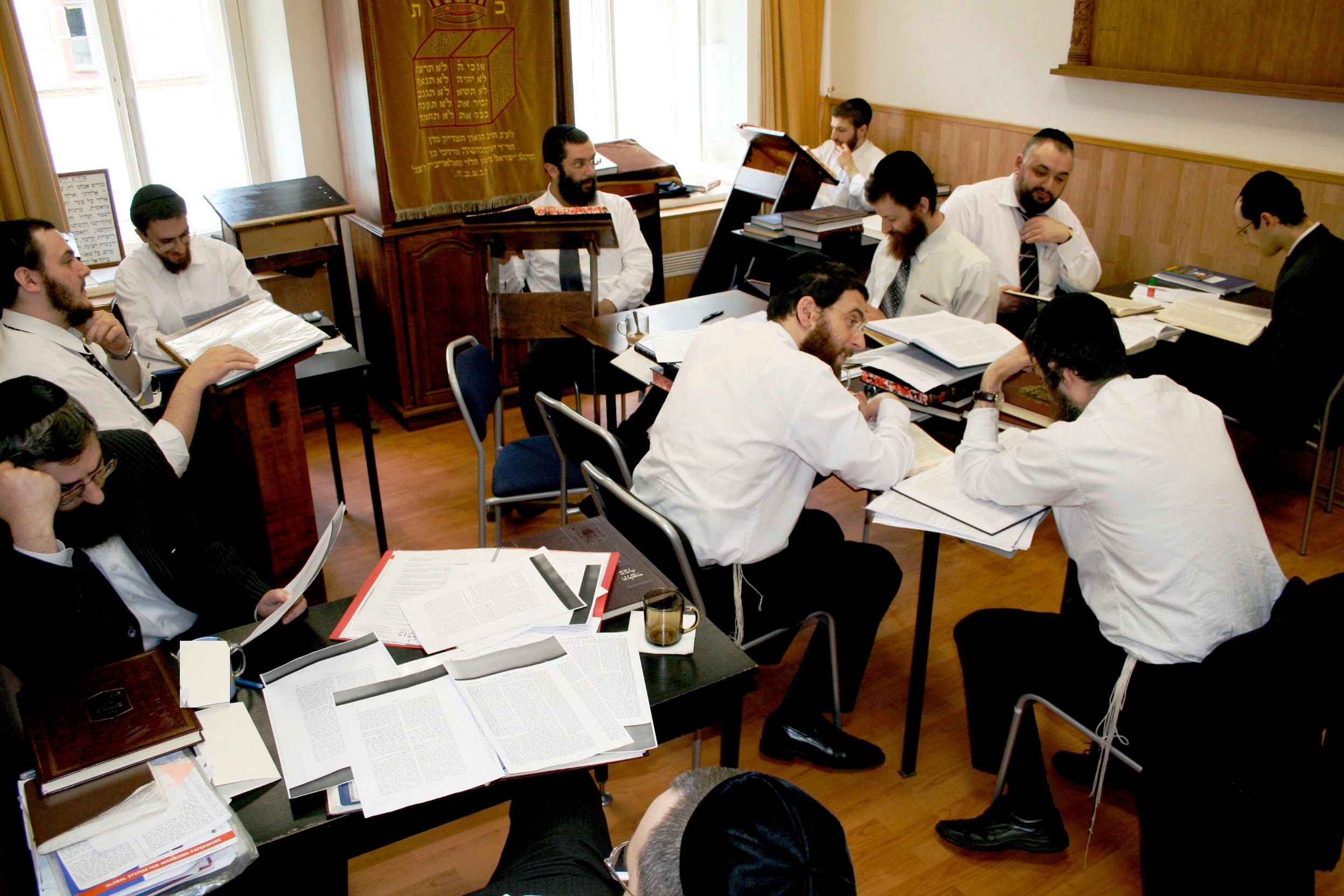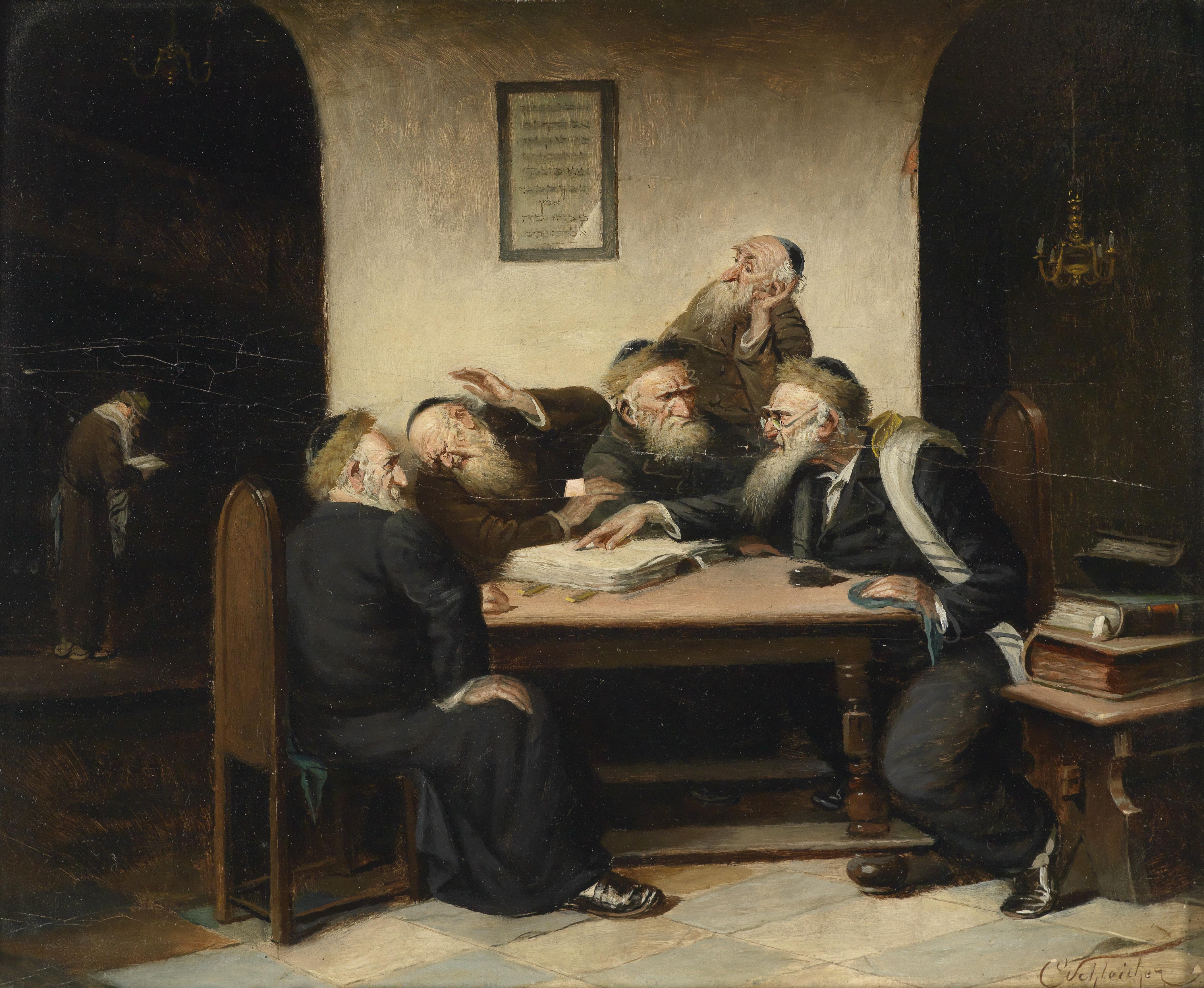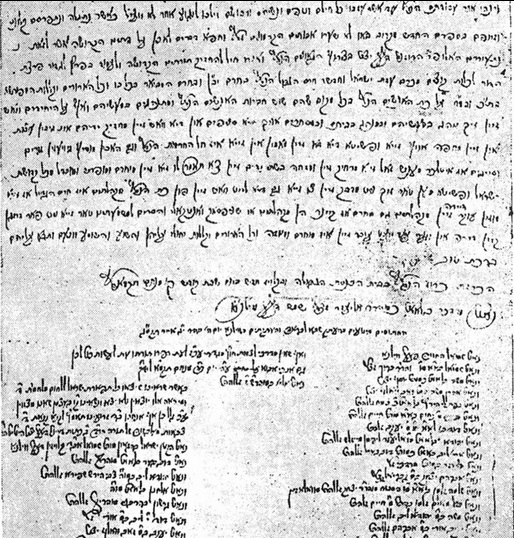|
Hashkafah
''Hashkafa'' ( he, השקפה, lit., "outlook"; plural ''hashkafot'', ''hashkafos'', ''hashkafas'') is the Hebrew term for worldview and guiding philosophy, used almost exclusively within Orthodox Judaism. A ''hashkafa'' is a perspective that Orthodox Jews adopt that defines many aspects of their lives. ''Hashkafa'' thus plays a crucial role in how these interact with the world around them, and influences individual beliefs about secularity, gender roles, and modernity. In that it guides many practical decisions - where to send children to school, what synagogue to attend, and what community to live in - ''hashkafa'' works in conjunction with ''halakha'' or Jewish law. ''Hashkafot'' Although there are numerous hashkafas ("70") within Orthodox Judaism, they may be grouped broadly as Haredi, Hasidic and Modern Orthodox / Religious Zionist, with different approaches and emphases concerning specific topics. Other ''hashkafas'' include ''Torah im Derech Eretz'', '' Talmidei haRamba ... [...More Info...] [...Related Items...] OR: [Wikipedia] [Google] [Baidu] |
Modern Orthodox Judaism
Modern Orthodox Judaism (also Modern Orthodox or Modern Orthodoxy) is a movement within Orthodox Judaism that attempts to synthesize Jewish values and the observance of Jewish law with the secular, modern world. Modern Orthodoxy draws on several teachings and philosophies, and thus assumes various forms. In the United States, and generally in the Western world, ''Centrist Orthodoxy'' underpinned by the philosophy of ''Torah Umadda'' ("Torah and secular knowledge") is prevalent. In Israel, Modern Orthodoxy is dominated by Religious Zionism; however, although not identical, these movements share many of the same values and many of the same adherents.Charles S. Liebman''Modern orthodoxy in Israel''Judaism, Fall, 1998 Modern Orthodoxy Modern Orthodoxy comprises a fairly broad spectrum of movements; each movement draws upon several distinct, though related, philosophies, which (in some combination) provide the basis for all variations of the movement today. Characteristics In gene ... [...More Info...] [...Related Items...] OR: [Wikipedia] [Google] [Baidu] |
Hebrew
Hebrew (; ; ) is a Northwest Semitic language of the Afroasiatic language family. Historically, it is one of the spoken languages of the Israelites and their longest-surviving descendants, the Jews and Samaritans. It was largely preserved throughout history as the main liturgical language of Judaism (since the Second Temple period) and Samaritanism. Hebrew is the only Canaanite language still spoken today, and serves as the only truly successful example of a dead language that has been revived. It is also one of only two Northwest Semitic languages still in use, with the other being Aramaic. The earliest examples of written Paleo-Hebrew date back to the 10th century BCE. Nearly all of the Hebrew Bible is written in Biblical Hebrew, with much of its present form in the dialect that scholars believe flourished around the 6th century BCE, during the time of the Babylonian captivity. For this reason, Hebrew has been referred to by Jews as '' Lashon Hakodesh'' (, ) since an ... [...More Info...] [...Related Items...] OR: [Wikipedia] [Google] [Baidu] |
Religious Zionism
Religious Zionism ( he, צִיּוֹנוּת דָּתִית, Romanization of Hebrew, translit. ''Tziyonut Datit'') is an ideology that combines Zionism and Orthodox Judaism. Its adherents are also referred to as ''Dati Leumi'' ( "National Religious"), and in Israel, they are most commonly known by the plural form of the first part of that term Datiim ( "Religious"). The community is sometimes called ''Kippah seruga'', literally, "Knitted kippah", the typical head covering which is worn by Jews, Jewish men. Before the establishment of the State of Israel, most Religious Zionists were observant Jews who supported Zionist efforts to build a Jewish state in the Land of Israel. Religious Zionism revolves around three pillars: the Land of Israel, the People of Israel, and the Torah of Israel. The Hardal ( ''Ḥaredi Le'umi''; lit., "Nationalist Haredi") are a sub-community, stricter in its observance, and more statist in its politics. Those Religious Zionists, who are less strict in the ... [...More Info...] [...Related Items...] OR: [Wikipedia] [Google] [Baidu] |
Kollel
A kollel ( he, כולל, , , a "gathering" or "collection" f scholars is an institute for full-time, advanced study of the Talmud and rabbinic literature. Like a yeshiva, a kollel features shiurim (lectures) and learning ''sedarim'' (sessions); unlike most yeshivot, the student body of a kollel typically consists mostly of married men. A kollel generally pays a regular monthly stipend to its members. History Original sense Originally, the word was used in the sense of "community". Each group of European Jews settling in Israel established their own community with their own support system. Each community was referred to as the "kollel of " to identify the specific community of the Old Yishuv. The overwhelming majority of these Jews were scholars who left their homelands to devote themselves to study Torah and serve God for the rest of their lives. The kollel was the umbrella organization for all their needs. The first examples were Kolel Perushim (students of the Vilna Gaon who ... [...More Info...] [...Related Items...] OR: [Wikipedia] [Google] [Baidu] |
Profession
A profession is a field of work that has been successfully ''professionalized''. It can be defined as a disciplined group of individuals, '' professionals'', who adhere to ethical standards and who hold themselves out as, and are accepted by the public as possessing special knowledge and skills in a widely recognised body of learning derived from research, education and training at a high level, and who are prepared to apply this knowledge and exercise these skills in the interest of others. Professional occupations are founded upon specialized educational training, the purpose of which is to supply disinterested objective counsel and service to others, for a direct and definite compensation, wholly apart from expectation of other business gain. Medieval and early modern tradition recognized only three professions: divinity, medicine, and law,Perks, R.W.(1993): ''Accounting and Society''. Chapman & Hall (London); . p.2. which were called the learned professions. A profession ... [...More Info...] [...Related Items...] OR: [Wikipedia] [Google] [Baidu] |
Chumra (Judaism)
A ''chumra'' ( he, wikt:חומרה, חומרה; pl. ; alternative transliteration: ) is a prohibition or obligation in Judaism, Jewish practice that exceeds the bare requirements of Halakha (Jewish law). One who imposes a ''chumra'' on oneself in a given instance is said to be ''machmir'' (). The rationale for a ''chumra'' comes from Deuteronomy 22:8, which states that when someone builds a house, he must build a fence around the roof in order to avoid guilt should someone fall off the roof. This has been interpreted by many as a requirement to "build a fence around the Torah" in order to protect the mitzvot. An obligation or prohibition can be adopted by an individual or an entire community. Early references to ''chumrot'' are found in the Talmud, and the understanding and application of them has changed over time. Most often found in Orthodox Judaism, ''chumrot'' are variously seen as a precaution against transgressing the Halakha or as a way of keeping those who have taken on ... [...More Info...] [...Related Items...] OR: [Wikipedia] [Google] [Baidu] |
Torah Study
Torah study is the study of the Torah, Hebrew Bible, Talmud, responsa, rabbinic literature, and similar works, all of which are Judaism's Sifrei kodesh, religious texts. According to Rabbinic Judaism, the study is done for the purpose of the ''mitzvah'' ("commandment") of Torah study itself. This practice is present to an extent in all religious branches of Judaism, and is considered of paramount importance among religious Jews. Torah study has evolved over the generations, as lifestyles changed and also as new texts were written. Traditional view In rabbinic literature, a heavy emphasis is placed on Torah study for Jews, Jewish males, with women being exempt. This literature teaches an eagerness for such study and a thirst for knowledge that expands beyond the text of the Tanakh to the entire Oral Torah. Some examples of traditional religious teachings: * The study of Torah is "equal to all" of the ''Mitzvah, mitzvot'' of Honour thy father and thy mother, honouring one's pare ... [...More Info...] [...Related Items...] OR: [Wikipedia] [Google] [Baidu] |
Lithuanian Jews
Lithuanian Jews or Litvaks () are Jews with roots in the territory of the former Grand Duchy of Lithuania (covering present-day Lithuania, Belarus, Latvia, the northeastern Suwałki and Białystok regions of Poland, as well as adjacent areas of modern-day Russia and Ukraine). The term is sometimes used to cover all Haredi Jews who follow a " Lithuanian" ( Ashkenazi, non- Hasidic) style of life and learning, whatever their ethnic background. The area where Lithuanian Jews lived is referred to in Yiddish as , hence the Hebrew term (). No other famous Jew is more closely linked to a specifically Lithuanian city than Vilna Gaon (in Yiddish, "the genius of Vilna"). Rabbi Elijah ben Solomon Zalman (1720–1797) to give his rarely used full name, helped make Vilna (modern-day Vilnius) a world center for Talmudic learning. Chaim Grade (1910–1982) was born in Vilna, the city about which he would write. The inter-war Republic of Lithuania was home to a large and influential Jewish ... [...More Info...] [...Related Items...] OR: [Wikipedia] [Google] [Baidu] |
Misnagdim
''Misnagdim'' (, "Opponents"; Sephardi pronunciation: ''Mitnagdim''; singular ''misnaged''/''mitnaged'') was a religious movement among the Jews of Eastern Europe which resisted the rise of Hasidism in the 18th and 19th centuries. The ''Misnagdim'' were particularly concentrated in Lithuania, where Vilnius served as the bastion of the movement, but anti-Hasidic activity was undertaken by the establishment in many locales. The most severe clashes between the factions took place in the latter third of the 18th century; the failure to contain Hasidism led the ''Misnagdim'' to develop distinct religious philosophies and communal institutions, which were not merely a perpetuation of the old status quo but often innovative. The most notable results of these efforts, pioneered by Chaim of Volozhin and continued by his disciples, were the modern, independent ''yeshiva'' and the Musar movement. Since the late 19th century, tensions with the Hasidim largely subsided, and the heirs of ''M ... [...More Info...] [...Related Items...] OR: [Wikipedia] [Google] [Baidu] |
Yeshivish
Yeshivish (), also known as Yeshiva English, Yeshivisheh Shprach, or Yeshivisheh Reid, is a sociolect of English spoken by Yeshiva students and other Jews with a strong connection to the Orthodox Yeshiva world. "Yeshivish" may also refer to non-Hasidic Haredi Jews. Sometimes it has an extra connotation of non-Hasidic Haredi Jews educated in yeshiva and whose education made a noticeable specific cultural impact onto them. In the latter case the term has ambivalent (both positive and negative) connotations comparable to these of the term "academic". The term appears to be a portmanteau word of ''yeshiva'' and ''English'', however, it may simply be formed from ''yeshiva'' + the adjectival suffix ''-ish''. Research Only a few serious studies have been written about Yeshivish. The first is a master's thesis by Steven Ray Goldfarb (University of Texas at El Paso, 1979) called "A Sampling of Lexical Items in Yeshiva English." The work lists, defines, and provides examples for nearly ... [...More Info...] [...Related Items...] OR: [Wikipedia] [Google] [Baidu] |
Haredi Judaism
Haredi Judaism ( he, ', ; also spelled ''Charedi'' in English; plural ''Haredim'' or ''Charedim'') consists of groups within Orthodox Judaism that are characterized by their strict adherence to ''halakha'' (Jewish law) and traditions, in opposition to modern values and practices. Its members are usually referred to as ultra-Orthodox in English; however, the term "ultra-Orthodox" is considered pejorative by many of its adherents, who prefer terms like strictly Orthodox or Haredi. Haredi Jews regard themselves as the most religiously authentic group of Jews, although other movements of Judaism disagree. Some scholars have suggested that Haredi Judaism is a reaction to societal changes, including political emancipation, the ''Haskalah'' movement derived from the Enlightenment, acculturation, secularization, religious reform in all its forms from mild to extreme, the rise of the Jewish national movements, etc. In contrast to Modern Orthodox Judaism, followers of Haredi Judaism ... [...More Info...] [...Related Items...] OR: [Wikipedia] [Google] [Baidu] |
Zvi Yehuda Kook
Zvi Yehuda Kook ( he, צבי יהודה קוק, 23 April 1891 – 9 March 1982) was a prominent ultranationalist Orthodox rabbi. He was the son of Rabbi Avraham Yitzhak Hacohen Kook, the first Ashkenazi chief rabbi of British Mandatory Palestine. Both father and son are credited with developing Kookian Zionism, which became the dominant form of Religious Zionism. He was Rosh Yeshiva of the Mercaz HaRav yeshiva. Kook's fundamentalist teachings were a significant factor in the formation and activities of the modern religious settlement movement in the Israeli-occupied West Bank and Gaza, largely through his influence on the Gush Emunim movement, which was founded by his students. Many of his ideological followers established such settlements, and he has been credited with the dissemination of his father's ideas, helping to form the basis of Religious Zionism. Kook presided for nearly six decades over the Mercaz HaRav yeshiva (The Rabbi's Centre) founded by his father in Jerusa ... [...More Info...] [...Related Items...] OR: [Wikipedia] [Google] [Baidu] |








